Gulf Coast – Summer/Fall 2015
This issue of Gulf Coast opens with the 2014 winner of the Gulf Coast Prize in Translation. The winning translation is a series of poems by Marcelo Morales, translated from Spanish to English by Kristin Dykstra. The first poem “36” explores the ways in which “presence” is felt within us: “[ . . . ] a river of the unemployed. The way in which terror functions, the constant stippling of fear within you.” This issue of Gulf Coast opens with the 2014 winner of the Gulf Coast Prize in Translation. The winning translation is a series of poems by Marcelo Morales, translated from Spanish to English by Kristin Dykstra. The first poem “36” explores the ways in which “presence” is felt within us: “[ . . . ] a river of the unemployed. The way in which terror functions, the constant stippling of fear within you.”
Following Morales’s poems are the honorable mentions including the poem “Silhouettes” by Ana Gorría, translated by Yvette Siegert. The title of the poem ties in nicely with the line, “but the thing that appears illuminated is nothing but a precise shadow,” and challenges the three dimensionality of the moment.
The 2014 Barthelme Prize Honorable Mention, “No One Makes Plans” by Patty Yumi Cottrell, follows the main character’s need to refuse plans, “All I want in my life is a great abandonment.’ / ‘Like a gray crumbling. Like the coral reefs scrubbed free of plankton.’” Yet, the narrator must face the reality that following along with the flow contradicts her nature.
“On Modeling and Mortification” by Rachel Howard is a nonfiction piece written about a middle-aged woman and her experiences as a nude art model. According to the narrator, “when you strip, fully strip, you forfeit the signals of your social identity and your status [ . . . ] you are just a body.” To the narrator, this experience is ultimately freeing, allowing her to embrace her true self even when clothed.
Jaren Watson’s piece “Which I Have Loved Long Since and Lost Awhile” is an elegy for his father, an attempt to remember him for who he was instead of his last actions. “Lacking the tangible pulse of his living flesh, I look for the narrative that makes sense of his life. And yet, by definition, definitions bind.” The act of remembering his father’s legacy on paper, concurrently memorializes his father’s act of death.
“Neon” by May-Lee Chai recounts her experiences over the years with silence in the face of violence where, “Silence is a virtue taught to girls. It makes them easier to control.” Chai visits many moments in her life, and her mother’s life, where silence was used as a tool to enable the bullies, whether it was the kids at school bullying her brother for being half-Asian in a small, white town, or her alcoholic grandfather’s abuse towards her mother.
“Hard Child” by Natalie Shapero rejects human tradition:
not recounting how the advent
of photography altered painting,
soured us on the acrylic portrait, [ . . . ]
toward the abstract, sent us [ . . . ]
to capture in oil that which film wouldnever be wasted on
By outright stating the speaker’s rejection of the past, or desire to turn away from the past, the poem simultaneously makes the past more permanent, more present, more there.
In MRB Chelko’s poem, “Beauty Be,” the narrator describes her daughter as she wears her grandmother’s necklace: “it is important / on occasion to recall the way a jewel ripens on the body / reflecting each new generation of light.” The jewels, take on a fleshly quality, becoming a physical representation of age and succession.
In “The Death of my Grandfather” by Christopher Robinson, the speaker elegizes his grandfather’s death, and while the title feels flat and does little work, the line breaks pick up the slack, adding tension where tension normally is not:
So many things
I want to own
before I go: A star
chart and a mouthful
of juice, the sound
of swarming gnats
over a river.
Featuring book reviews, art and literary art criticism, and interviews with authors and artists such as Tarfia Faizullah and Chitra Ganesh, this issue of Gulf Coast is sure to satisfy even the most diverse reader.
[www.gulfcoastmag.org]





